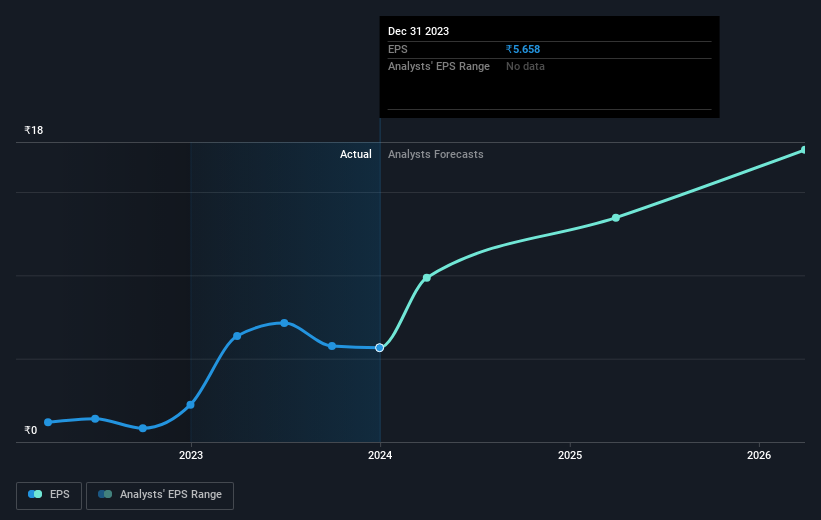Stock Analysis

It might be of some concern to shareholders to see the The New India Assurance Company Limited (NSE:NIACL) share price down 13% in the last month. But that doesn't detract from the splendid returns of the last year. Indeed, the share price is up an impressive 136% in that time. So it may be that the share price is simply cooling off after a strong rise. More important, going forward, is how the business itself is going.
The past week has proven to be lucrative for New India Assurance investors, so let's see if fundamentals drove the company's one-year performance.
View our latest analysis for New India Assurance
While markets are a powerful pricing mechanism, share prices reflect investor sentiment, not just underlying business performance. One flawed but reasonable way to assess how sentiment around a company has changed is to compare the earnings per share (EPS) with the share price.
During the last year New India Assurance grew its earnings per share (EPS) by 152%. We note that the earnings per share growth isn't far from the share price growth (of 136%). So this implies that investor expectations of the company have remained pretty steady. It looks like the share price is responding to the EPS.
The image below shows how EPS has tracked over time (if you click on the image you can see greater detail).

We know that New India Assurance has improved its bottom line lately, but is it going to grow revenue? You could check out this free report showing analyst revenue forecasts.
What About Dividends?
It is important to consider the total shareholder return, as well as the share price return, for any given stock. Whereas the share price return only reflects the change in the share price, the TSR includes the value of dividends (assuming they were reinvested) and the benefit of any discounted capital raising or spin-off. So for companies that pay a generous dividend, the TSR is often a lot higher than the share price return. In the case of New India Assurance, it has a TSR of 140% for the last 1 year. That exceeds its share price return that we previously mentioned. The dividends paid by the company have thusly boosted the total shareholder return.
A Different Perspective
It's good to see that New India Assurance has rewarded shareholders with a total shareholder return of 140% in the last twelve months. And that does include the dividend. That's better than the annualised return of 5% over half a decade, implying that the company is doing better recently. Someone with an optimistic perspective could view the recent improvement in TSR as indicating that the business itself is getting better with time. I find it very interesting to look at share price over the long term as a proxy for business performance. But to truly gain insight, we need to consider other information, too. For example, we've discovered 2 warning signs for New India Assurance (1 doesn't sit too well with us!) that you should be aware of before investing here.
If you are like me, then you will not want to miss this free list of growing companies that insiders are buying.
Please note, the market returns quoted in this article reflect the market weighted average returns of stocks that currently trade on Indian exchanges.
Valuation is complex, but we're helping make it simple.
Find out whether New India Assurance is potentially over or undervalued by checking out our comprehensive analysis, which includes fair value estimates, risks and warnings, dividends, insider transactions and financial health.
View the Free AnalysisHave feedback on this article? Concerned about the content? Get in touch with us directly. Alternatively, email editorial-team (at) simplywallst.com.
This article by Simply Wall St is general in nature. We provide commentary based on historical data and analyst forecasts only using an unbiased methodology and our articles are not intended to be financial advice. It does not constitute a recommendation to buy or sell any stock, and does not take account of your objectives, or your financial situation. We aim to bring you long-term focused analysis driven by fundamental data. Note that our analysis may not factor in the latest price-sensitive company announcements or qualitative material. Simply Wall St has no position in any stocks mentioned.
About NSEI:NIACL
New India Assurance
The New India Assurance Company Limited, together with its subsidiaries, operates as a general insurance company in India and internationally.
Excellent balance sheet with proven track record.

